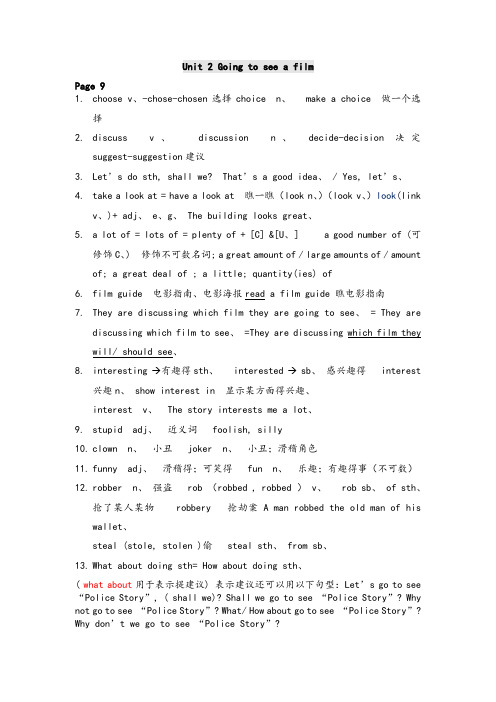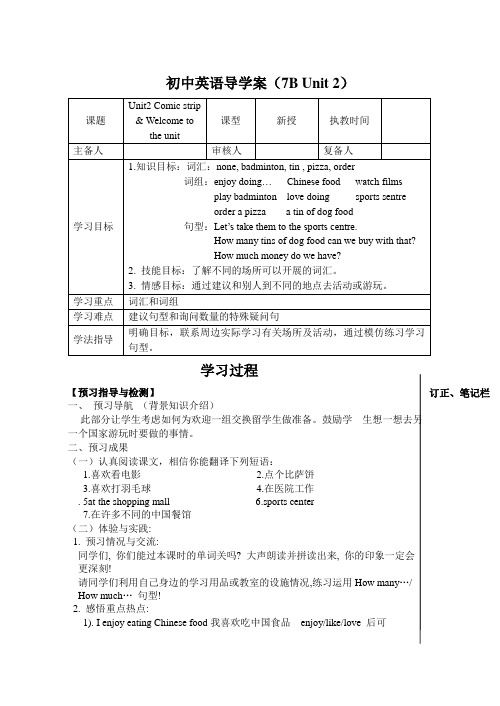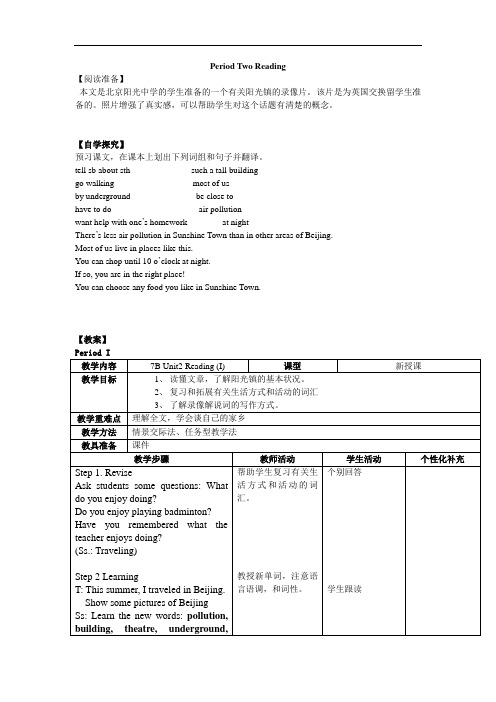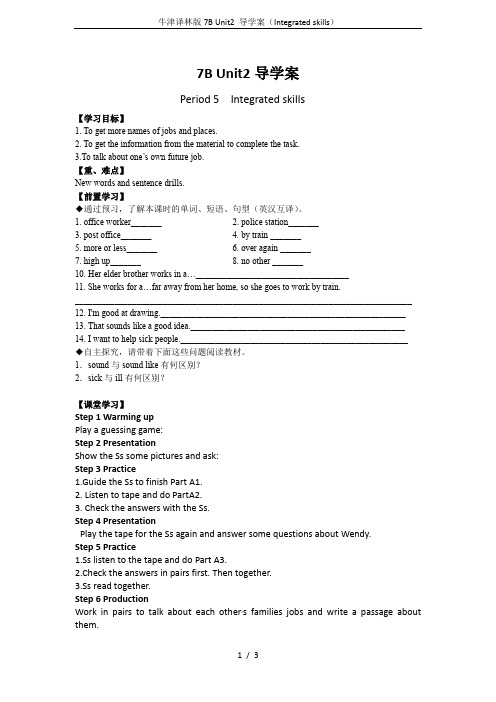7B第二单元学案
最新上海版牛津英语7B-Unit2-导学案

Unit 2 Going to see a filmPage 91.choose v、-chose-chosen选择choice n、 make a choice 做一个选择2.discuss v、discussion n、decide-decision决定suggest-suggestion建议3.Let’s do sth, shall we? That’s a good idea、 / Yes, let’s、4.take a look at = have a look at 瞧一瞧(look n、)(look v、)look(linkv、)+ adj、 e、g、 The building looks great、5. a lot of = lots of = plenty of + [C] &[U、] a good number of (可修饰C、)修饰不可数名词; a great amount of / large amounts of / amount of; a great deal of ; a little; quantity(ies) of6.film guide 电影指南、电影海报read a film guide 瞧电影指南7.They are discussing which film they are going to see、 = They arediscussing which film to see、 =They are discussing which film they will/ should see、8.interesting →有趣得sth、 interested → sb、感兴趣得 interest兴趣n、 show interest in 显示某方面得兴趣、interest v、 The story interests me a lot、9.stupid adj、近义词 foolish, silly10.clown n、小丑 joker n、小丑;滑稽角色11.funny adj、滑稽得;可笑得 fun n、乐趣;有趣得事(不可数)12.robber n、强盗 rob (robbed , robbed ) v、 rob sb、 of sth、抢了某人某物 robbery 抢劫案 A man robbed the old man of his wallet、steal (stole, stolen )偷 steal sth、 from sb、13.What about doing sth= How about doing sth、( what about用于表示提建议) 表示建议还可以用以下句型:Let’s go to see “Police Story”, ( shall we)? Shall we go to see “Police Story”? Why not go to see “Police Story”? What/ How about go to see “Police Story”? Why don’t we go to see “Police Story”?警察故事怎么样14.What is the film about? 这部电影就是关于什么得?15.action film 动作片love film 爱情电影cartoon 卡通片exciting film 惊险片 cowboy film 西部片,特指牛仔电影 horror story 恐怖片 police story 警匪片 funny film 喜剧片detective story 侦探片adventure film 冒险故事documentary 纪录片以上划线用:What kind of film提问16.action n、动作→act v、行动;扮演active adj、积极得,活跃得 take anactive part in, actor n、男演员 actress n、女演员activity n、活动take action采取行动Actions speak louder than words、事实胜于雄辩17.films about adventures/ clowns 关于冒险/小丑得电影18.adventures of some astronauts in space 一些宇航员在太空中得冒险经历19.this (ing) Saturday本周六20.excite v、使兴奋--exciting a、令人激动得;刺激得--excited a、(感到)激动得21.hate 用法同like hate to do sth、=hate doing sth、 Mary hates beinglate for school、 = Mary hates to be late for school、 [近义]: dislike [反义]: like22.adventure n、冒险;奇遇(活动)--adventurous a、冒险得adventurer n、冒险者23.love v、喜爱--lovely a、可爱得24.stupid a、愚蠢得--stupidly a、愚蠢地 stupid =foolish =silly 傻得;蠢得25.go to see a film =go to the cinema 去瞧电影= go to the movies26.want to see a film =would like to see a film 想瞧电影27.princess 公主 prince 王子28.like sth、 very much 非常喜欢某物 like sth、 better =prefer sth、比较喜欢某物 like sth、 best 最喜欢某物29.Neither 用法小结1、 neither用作形容词,表示“(两者)都不”,置于单数名词之前。
牛津英语 7B Unit2 导学案 7b U2-1 doc

初中英语导学案(7B Unit 2)学习过程【预习指导与检测】 一、 预习导航 (背景知识介绍)此部分让学生考虑如何为欢迎一组交换留学生做准备。
鼓励学 一个国家游玩时要做的事情。
二、预习成果 (一)认真阅读课文,相信你能翻译下列短语:1.喜欢看电影________________2.点个比萨饼_______________3.喜欢打羽毛球______________4.在医院工作_______________. 5at the shopping mall_______________ 6.sports center______________7.在许多不同的中国餐馆____________(二)体验与实践:1. 预习情况与交流:同学们, 你们能过本课时的单词关吗? 大声朗读并拼读出来, 你的印象一定会更深刻!请同学们利用自己身边的学习用品或教室的设施情况,练习运用How many …/How much … 句型!2. 感悟重点热点:1). I enjoy eating Chinese food 我喜欢吃中国食品 enjoy/like/love 后可2). Let’s take them to a shopping mall. 让我们把他们带到大卖场.take …to…意思为“把…带到…”,其反义词组是bring…to…例如:She often takes her sister to the park on Sundays. 她在周日经常把她的妹妹带到公园。
Please bring your homework tomorrow.明天请把你的作业带过来。
3)完成下列句子1. How many ________(听)of dog food are there in Eddie’s fridge?2.__________(没有)of the answers are right.3. __________(欢迎) to our town for a trip.4. My favourite sport is ___________(羽毛球).5. We can buy only one pizza _______(用) the money.6. What dishes do you want to ________(点)?【课堂导学与互动】任务一:了解周边环境回答下列问题1.Is there a supermarket?2.Are there many restaurants?3.Is there a cinema?4.Is there a sports center?5.What other places are there around your home?任务二:.完成课本第25页A部分和B部分的书面练习。
7b unit2导学案及教案

Period Two Reading【阅读准备】本文是北京阳光中学的学生准备的一个有关阳光镇的录像片。
该片是为英国交换留学生准备的。
照片增强了真实感,可以帮助学生对这个话题有清楚的概念。
【自学探究】预习课文,在课本上划出下列词组和句子并翻译。
tell sb about sth such a tall buildinggo walking most of usby underground be close tohave to do air pollutionwant help with one‟s homework at nightThere‟s less air pollution in Sunshine Town than in other areas of Beijing.Most of us live in places like this.You can shop until 10 o‟clock at night.If so, you are in the right place!You can choose any food you like in Sunshine Town.【教案】Period II【当堂巩固】1.试译一下词组:乘坐地铁__________________ 离…..近______________________我们中的大多数_________________ 去散步_____________________这样一幢高楼___________________ 空气污染___________________北京市中心_____________________ 直到晚上十点_____________________2.你能正确写出这些单词吗?注意有些是要变化形式的。
a)People in Nanjing can go shopping by ___________(地铁) soon.b)There‟s less air__________(污染) in the country than in the city.c)Children in poor________(地区) need help.d)People in _________(西方的) countries celebrate Christmas every year.e)I can‟t believe _______(如此) a young girl can swim so well.f)Jerry watches TV every night and he doesn‟t go to bed _______(直到) eleven o‟clock atnight.g)_________(当地) people usually know much about the traditions there.h)My school is about three miles________(远) from my home.i)Most of us live in tall __________(楼房) today.j) Who____________(教) you English this year?3.试一试能否改正下列句子中的错误:a)There is little water in this cup than in that one.b)We have to wearing school clothes at the assembly.c)Simon often goes walk in the park.d)Everyone in Sunshine Town speak Chinese.e)Such big an egg surprised(使…惊讶) all of us.4.完成句子:1.他每天骑自行车上学要花半小时时间。
译林牛津7Bunit2全套精品教案精品

译林牛津 7B unit2 全套精品教案精品一、教学内容二、教学目标1. 了解香港的地理、文化、美食等基本信息,提高学生的英语阅读能力。
2. 培养学生的合作精神,通过小组讨论、分享,提高学生的口语表达能力。
3. 培养学生的写作能力,通过仿写旅游日志,让学生掌握游记的基本写作框架。
三、教学难点与重点1. 教学难点:阅读理解、词汇和语法难点,如:定语从句、现在进行时等。
2. 教学重点:香港旅游景点、美食文化的介绍,以及游记的写作方法。
四、教具与学具准备1. 教具:多媒体教学设备、PPT、黑板、地图等。
2. 学具:英语教材、笔记本、文具等。
五、教学过程1. 导入:通过展示香港风光图片,激发学生的兴趣,引入本节课的主题。
2. 阅读前:让学生看图片,预测文章内容,培养学生的预测能力。
3. 阅读中:引导学生阅读文章,理解文章大意,讲解词汇和语法难点。
4. 阅读后:组织学生进行小组讨论,分享对香港的了解,提高口语表达能力。
5. 写作环节:教授游记写作方法,让学生仿写旅游日志。
6. 随堂练习:设计相关习题,巩固所学知识。
六、板书设计1. A trip to Hong Kong2. 主要内容:Hong Kong's location(香港的地理位置)Tourist attractions(旅游景点)Food culture(美食文化)Travel diary writing(旅游日志写作)七、作业设计1. 作业题目:Write a travel diary about your dream trip to Hong Kong(写一篇关于你梦想中香港之旅的旅游日志)。
2. 答案:学生需根据课堂所学,结合个人兴趣,完成一篇关于香港之旅的旅游日志。
八、课后反思及拓展延伸2. 拓展延伸:鼓励学生在课后了解更多关于香港的信息,提高学生的跨文化交际能力。
可以推荐学生观看相关纪录片、阅读英文旅游指南等。
重点和难点解析1. 教学难点:阅读理解、词汇和语法难点。
7BU2全新优化版学案学生版

授课类型T 重点单词和短语速记 C 7BU2查缺补漏T 阅读能力训练教学内容Unit 2◆单词回顾:英文词性中文补充拓展愚蠢的,笨的近义词:adj. 愚蠢的,鲁莽的adj. 傻的,愚蠢的动作v.行动adj. 积极的n.活动盗贼v. 抢劫n. 抢劫案讨厌,不喜欢=hate doing something讨厌做某事冒险,奇遇公主王子持续时间在……期间笑,笑声v.大笑,发笑牛仔(工作日程)记事记日记13. altogether adv.总共,一共Altogether there were 18 people in the bus. 公共汽车上一共有18个人。
【近义词】总共,全部14. price n. 价格What is the price of this pair of trousers? 这条裤子多少钱?= How much is this pair of trousers?或How much does this pair of trousers cost?【拓展】adj. 高价的,昂贵的,贵重的,宝贵的15.*avenue n. 大街Fifth Avenue is a good place for shopping.(纽约市)第五大街是个逛街的好去处。
指点迷津: avenue, street, road, lane 和way指“宽敞的大路或街道,通常是城镇两边有树的、通往较大建筑的大街”,指“城镇里较窄、短的重要的街道,两旁多有建筑物”;指“较长、宽的路,通常是行驶车辆,且穿过城镇或连接其他城镇的道路”;指“乡间的小路或城镇里狭窄的胡同、街道”;指“通向某一处的道路”。
16. bookshop n. 书店I found this book in a secondhand bookshop in Edinburgh. 我在爱丁堡的一个旧书店里找到这本书。
【近义词】n. 书店17. route n. 路线与route搭配的形容词多用或,而不用far或close。
牛津译林版7B Unit2 导学案(Integrated skills)

7B Unit2导学案Period 5 Integrated skills【学习目标】1. To get more names of jobs and places.2. To get the information from the material to complete the task.3.To talk about one’s own future job.【重、难点】New words and sentence drills.【前置学习】◆通过预习,了解本课时的单词、短语、句型(英汉互译)。
1. office worker_______2. police station_______3. post office_______4. by train _______5. more or less_______6. over again _______7. high up_______ 8. no other _______10. Her elder brother works in a…___________________________________11. She works for a…far away from her home, so she goes to work by train._____________________________________________________________________________12. I'm good at drawing.________________________________________________________13. That sounds like a good idea._________________________________________________14. I want to help sick people.____________________________________________________◆自主探究,请带着下面这些问题阅读教材。
牛津7BUnit2学案(十课时)
牛津7B Unit 2学案UNIT2,Welcome to Sunshine TownTeaching plans for Period1: Welcome to the unit一、教学目标:1、熟练掌握一下字、词、句。
none order badminton tin pizza maybe sports centerThere’s no dog food.How many tins of dog food can we buy with that?Maybe we can order a pizza.Let’s take them to the sports center.2、难点:有关地点与活动的词汇的熟练运用。
二、预习导学1、There’s no dog food. 没有狗食了。
=There isn’t any dog food.no 有时可以和not any 相互替换。
I have no money.==_________________________________________.There’re no calories in water.==______________________________________.2、How many tins of dog food can we buy with that? 我们可以用它买多少听狗食呢?注意此句with 的用法,指凭借、使用某种工具。
What did you buy with your pocket money? 你用你的零花钱买了什么?Can you make a kite ____ silk and wood?你能用丝绸和木头制作风筝吗?翻译:我用钢笔写我的家庭作业。
______________________________________.3、Let’s take them to the sports center. 我们把他们带到体育运动中心去吧?“take 某人或物to 某地”——-把某人或某物带到某地My father took me to the hospital when I was ill last month.My parents will take me home if they know I’m here again.预习自测:1、读Hobo与Eddie的对话后回答下列问题:1)Are they hungry?2)Is there any food left?3)Where does Eddie want to buy more food?4)Do they have any money? How much?5)What can they buy in the supermarket with only one yuan?6)Does a pizza cost only one yuan?2、翻译下列词组:打羽毛球________________ 看电影_________________________点一些食物__________________ 购物中心______________________体育运动中心__________________ 中国菜________________________3、根据句意或首字母填空:1)Li Yongbo is very good at playing b_______________.2) I don’t know where Mr Wu is. M_______ he is on the playgound.3) My favourite food is p_______.4)A big building with many shops can be called a s________________.5) Simon likes playing football. We can often find him at the s_________________.6) My home is far from my school. So I have lunch at a r___________ near school.7) I watched the film“the world without thieves” at Hongxing T__________ last Sunday.三、课堂教学活动.Step1:Warming-up activities.Step2: Listen, read and say.Step3: Read and learn.Steo4: Do exercises for consolidation.Step5: Play a gameT eaching plans for Period2: Reading1一、教学目标:1、理解课文大意,识记课文内的新单词和词组。
译林牛津7Bunit2全套教案
译林牛津 7B unit2 全套教案一、教学内容本节课选自译林牛津7B教材第二单元,主要内容包括:Reading 部分“Neck and Neck”以及相关的语法和词汇。
详细内容涉及一般过去时的运用,动词的过去式变化,以及比赛、动物、旅游等话题的相关词汇。
二、教学目标1. 能够理解并运用一般过去时描述过去发生的事情。
2. 能够正确运用本节课所学的动词过去式及其相关词汇。
3. 能够通过阅读文章,提取关键信息,了解文章大意。
三、教学难点与重点教学难点:一般过去时的运用及动词过去式的变化。
教学重点:阅读文章的理解,以及相关词汇和语法点的掌握。
四、教具与学具准备1. 教师准备:PPT、黑板、教材、阅读文章。
2. 学生准备:教材、笔记本、文具。
五、教学过程1. 导入:通过展示一组关于旅游的照片,引导学生谈论过去的旅游经历,激发学生对本节课的兴趣。
2. 阅读前:引导学生预测文章内容,通过提问方式激发学生的阅读兴趣。
3. 阅读中:学生自主阅读文章,完成相关练习,教师进行讲解和指导。
4. 阅读后:学生进行小组讨论,讨论文章中的关键信息,进行角色扮演等活动。
5. 语法讲解:教师讲解一般过去时及动词过去式的变化规则,并进行例句展示。
6. 随堂练习:设计相关练习题,让学生巩固所学知识。
六、板书设计1. Neck and Neck2. 重点词汇:比赛、动物、旅游等话题词汇;一般过去时;动词过去式3. 主要句子:文章中的关键句型;一般过去时的句子示例七、作业设计1. 作业题目:(1)根据课文内容,完成填空题。
(2)运用一般过去时,编写一段关于自己过去旅游经历的小故事。
2. 答案:八、课后反思及拓展延伸1. 课后反思:教师应关注学生在课堂上的表现,及时发现问题,调整教学方法,提高教学效果。
2. 拓展延伸:鼓励学生在课后进行更多关于一般过去时的练习,提高英语实际运用能力。
同时,引导学生关注现实生活中的相关话题,激发学习兴趣。
牛津英语7Bunit2教学案1
牛津英语7Bunit2教学案1 Unit2welcometoSunshineTown【学习目标】.听取细节,提炼信息。
2.了解有关故宫的知识。
3.学会介绍环境。
4.学会会出行做安排。
【课前自主学习】一.讲下列词组翻译成英语.故宫博物馆____________________2.艺术品_____________________________3.很有趣________________________4.玩一整天___________________________5.中国画________________________6.在学校见你_________________________7.没赶上公共汽车_____________________8.听起来很棒_________________________要点点拨:.Don’tmissthegreatshowmiss动词,意为“错过,没赶上”e.gHurryup,oryou’llmissthebus.意为“想念”e.gI’llmissmymotherallthetime.2.worksofart意“艺术品”works表示“作品,著作”,为复数,作为“工作”时,是不可数名词,而job做名词“工作”,是可数名词。
work也做动词“工作”。
3.lotsoffun很有趣fun做名词“乐趣”是不可数名词e.ghvefun=haveagoodtime4.afullday一整天full是形容词“满的,饱的”befullof“满是…../装满…..”I’mfull.Idon’twanttoeatanymore.【课堂检测】一、用所给词的适当形式填空.There’llbeane_______atthePalacemuseum.2.wecanseefinew____ofarttomorrow.3.we’llseeastonec________inBaohePalace.4.Gotovisitthegolden_______(宝座)inTaihePalace.5.Toseemore_________(纪念物),youcangotoBaohePalace.6.__________we__________(将要离开)schoolat8a.mtomorrow?【课后作业】一、完成下列对话:A:____________you____________togotoBeijingZootomorrow?B:yes,_________liketo._____________canweseethere?A:wecanseelotsoflargeanimals.B:_____________weleavetomorrowmorning?A:At7:00a.m.B:yes,that’s__________.I____________youat7a.m.tomorrow.二、用所给词的正确形式填空:.where________they___________eachotherlastyear?2.when_________you__________?I___________in1988.3.It’s12o’clock.TheSmiths____________lunch.4.where’sjack?He__________inthereadingroom.He________ withhisfriends.5.who__________bestinyourclass?IthinkLucy_________.6.canyoudance?No,Ican’t.Butmary_________well.7.There____________anexhibitionatBeijingZooTomorrow.8whattime_________we________tomorrowmorning?9.we___________thereat9a.m.tomorrow.Unit2welcometoSunshineTown【学习目标】.学习在写作前搜索信息的方法。
译林牛津7Bunit2全套教案精品
译林牛津 7B unit2 全套教案精品一、教学内容本节课选自译林牛津版7B英语教材,主要围绕Unit 2 Reading: A tourist guide部分进行。
教学内容包括教材第22页至第25页,详细内容为介绍某个旅游胜地的指南,涵盖了对该地区的气候、主要景点、美食和活动的描述。
二、教学目标1. 学生能够理解并掌握文章的主要内容和细节,了解旅游指南的基本构成和表达方式。
2. 学生能够运用目标语言(如:It has a mild climate, The local food is delicious, etc.)来描述一个旅游胜地。
3. 学生能够在现实生活中运用所学知识,编写一份简单的旅游指南。
三、教学难点与重点1. 教学难点:理解并运用描述旅游胜地的目标语言,如:It hasa mild climate, The local food is delicious, etc.2. 教学重点:掌握文章的结构和表达方式,学会编写旅游指南。
四、教具与学具准备1. 教具:多媒体设备、PPT、黑板、教材。
2. 学具:笔记本、文具、教材。
五、教学过程1. 导入:通过展示一组旅游胜地的图片,让学生猜测这些地方的特点和吸引人的地方,引出本节课的主题。
2. 阅读前:让学生根据图片预测文章内容,激发学生的阅读兴趣。
a. Prereading:展示与文章相关的图片,引导学生预测文章内容。
b. Whilereading:让学生快速阅读文章,验证预测。
3. 阅读中:引导学生深入学习文章,掌握文章内容和目标语言。
a. Skimming:让学生快速阅读文章,了解文章大意。
b. Scanning:让学生细读文章,找出文章中的关键信息。
c. Intensive reading:对文章进行深入解读,讲解文章中的语言点。
4. 阅读后:学生运用所学知识,进行实践练习。
a. 口语练习:学生分组,运用目标语言描述一个旅游胜地。
b. 写作练习:学生编写一份简单的旅游指南。
- 1、下载文档前请自行甄别文档内容的完整性,平台不提供额外的编辑、内容补充、找答案等附加服务。
- 2、"仅部分预览"的文档,不可在线预览部分如存在完整性等问题,可反馈申请退款(可完整预览的文档不适用该条件!)。
- 3、如文档侵犯您的权益,请联系客服反馈,我们会尽快为您处理(人工客服工作时间:9:00-18:30)。
7B牛津英语第一单元学案Travelling around the world姓名班级第一课时Words and Phrases (单词和词组讲解)1、Travelling around the world 重点(1)aroundprep:―围绕;在……周围‖Eg:The earth goes around the sun 地球围绕太阳转adv :―大约,到处‖Eg:The bag is around three kilos 这个包大约有三公斤2、The French flag 法国国旗▲(1)Frenchadj:法国的,法国人的,法语的Eg:Do you like French dishes?你喜欢法国菜吗?n:法语/法国人Eg:The villagers spoke French 村民们讲法语On my way home,I met a Frenchman 在回家的路上,我遇到了一个法国人3、Don' be silly别说傻话(1)sillyadj:糊涂的,没头脑的Eg:Oh,how silly you all are! 哦,你们都那么傻silly 常用句式:be silly to do sth = it's silly of sb to do sth 做某事是愚蠢的▲★Eg:You are silly to spend so much money on clothes= It's silly of you to spend so much money on clothes 你花那么多钱买衣服,真是愚蠢4.F r a n c e i s i n W e s t e r n E u r o p e.▲western adj. ―西面的,西部的‖ west n.西方Western ―欧美的,西方的‖ eg. the Western countries 西方国家Western culture 西方文化eg. My house is in the western part of the town.[拓展] 词根-ern表示方位。
eg.eastern 东方的,东部的southern 南方的,南部的northern 北方的,北部的southeastern 东南的,东南部的southwestern 西南的,西南部的northwestern 西北的,西北部的northeastern 东北的,东北部的5. Here you will find many famous places of interest such as theEiffel Tower.a. Here 指代―In Paris ‖b. Places of interest 名胜古迹interest Un. 兴趣,趣味There are many places of interest in Beijing.His interest is reading.c. such as ‗例如‘ 用来补充说明前面的事物eg. They planted flowers such as roses in the garden.区分:such as & for example ▲such as 用来列举整体之中的部分同类事物,插在被列举事物与前面的名词之间。
其后面不可有逗号,后接n&n词组,还可以与and so on 连用eg. I visited some cities such as Beijing, Shanghai and Dalian.for example 可缩写成e.g. 用来列举说明。
在句中多作插入语,可置于句首,句中,句末。
其后需有逗号。
eg. I‘d like to keep a pet, for example,a dog.6. France is very famous for its wine. ▲be famous for 因……而闻名eg. China is famous for the Great Wall.be famous as 以……(身份)而出名eg. MoYan was famous as a writer.区分:be famous for & be famous asa. 当主语时表示人的名词时,be famous for 表示―因作品或特征而出名‖,be famous as则表示―作为某种身份而出名‖eg. He is famous for his great inventions.He is famous as a great inventor.b. 当主语时表示地点的名词时,be famous for表示‗因某种特点(产品。
建筑。
名胜)而出名‘ be famous as 表示―以什么产地/地方而出名‖eg. France is famous for its fine food and wine.The town is famous as a wine-producing place.7 ….and farmers grow grapes to make excellent French wine. a. excellent adj.= very good/wonderful 优秀的,极好的。
excellent 口语表示赞同。
好极了。
Be excellent at/in sth 在某方面优秀eg. She is excellent at sports.b. make wine 酿造葡萄酒These wines are all made from grapes.[拓展]make ‗制作‘ 构成以下句式▲★A. be made by sb 由某人制成eg. This coat was made by my mother.B. be made of sth 由… 制成(制成品能看出原材料)eg. Our desks are made of wood.C. be made from 由… 制成(制成品看不出原材料)eg. This kind of paper is made from grass.D.be made into 被制成…eg. Wood can be made into many kinds of furniture.E.be made in在… 地方制作或生产Eg. This kind of car is made in Beijing.8. The south of France lies on the coast, and it is famous for its wonderful beaches.On the coast 在海岸线上,在海岸Eg. We live on the coast.9. A French town by the sea is the perfect place for a summerholiday 法国的海滨小镇是夏季完美的度假地(1)by the sea 在海边;by the river 在河边▲备注:by the sea和by sea 的区别Eg:We stayed in the hotel ______sea.He went by sea, and sent his heavy boxes ______sea.10. … if you prefer to visit France in winter,you can try skiing on the mountains in the French Apls.①prefer to do sth=like to do sth better 更喜欢做某事▲eg. He prefers to walk in the rain.I prefer to spend the weekend at home.[拓展]prefer 的其他用法▲★a. prefer + n/vingeg. Do you prefer meat or fish?----Do you like swimming?----Yes, but I prefer skiing.b. prefer A or B 喜欢A胜过B(A和B可以是n&vinng)I prefer dogs to cats.I prefer staying at home to going out.c. prefer to do sth rather than do sth 更愿意….不愿…..We preferred to walk rather than take a bus.I prefer to go shopping rather than stay at home.= I prefer going shopping to staying at home.② try doing sth 尝试做某事——I usually go there by train.——Why not try going by boat for a change?区分:try to do & try doingTry to do 表示努力设法去做某事,试图,尽力做某事。
He tried to climb the tree, but he could not.Try doing 表示尝试着去做某事,经常表示建议做某事Why don‘t you try listening to some light music?11. Why not visit France this year? ▲=Why don‘t you visit France this year?=How/What about visiting ………?[拓展] 表示建议的表达有:A. Why not d o sth?/ Why don‘t you do sth?为什么不…..呢?Why not ask for your teacher‘s help?=Why don‘t you ask………?B. What/How about (doing) sth?What about going to play football?C. Would you like /love (to do) sth?Would you like to go to the cinema with me?D. Shall I/we do sth?我们做….好吗?Shall we go to the park this Sunday?E. Let‘s do…., shall we?Let‘s listen to musia,shall we?F. 主语+had better (not) do sth?You‘d better go to hospital at once.You‘d better not stay at home all day.第二课时Exercises of the words and phrases (单词词组练习)一、词语运用1、Hangzhou is the palace to g____ this summer.2、Which park is the most b____ in Dalian?3、Beijing is the c_____ of China4、We are going to visit the science m____ next Sunday.5、The word e____ means very good.6、Germany as well as France is a _____ country(west)7、There is a ____ film tonight. Let's go and see it .(wonder)8、My grandpa was a ____ in the past.(farm)9、Hainan is famous for its ______.(beach)10、Why not try ___a card yourself?(make)11、People from _____________ speak _____________. (French,France)12、This story is about three _____________. (French, Frenchman,Frenchmen)13、France is famous ___________its food. (as, for)14、Tom jumps__________ than me. (taller, higher)15、Don‘t be ___________. (fool, silly)二、选词填空(必要时,须改变单词的形式。
